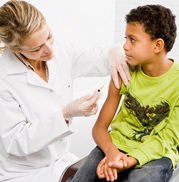 As vaccine-preventable disease are now seen less often than in the past, the public has grown complacent about the threat they pose. They are not the only ones: doctors are prone to complacency too.
As vaccine-preventable disease are now seen less often than in the past, the public has grown complacent about the threat they pose. They are not the only ones: doctors are prone to complacency too.
New research published in the journal Vaccine shows that, compared to older doctors, younger doctors are less likely to be concerned about vaccine-preventable diseases.
This is mainly because newer medical graduates rarely – if ever – see cases of measles or pertussis, let alone tetanus or diphtheria. Had they been practising a generation or two ago they would probably have seen some of these diseases relatively frequently.
The new study, based on a survey of GPs, found that younger doctors perceived the risk of vaccine-preventable diseases to be lower, were less likely to believe vaccine to be safe, and were more likely than experienced doctors to believe that the risks outweigh the benefits of immunisation.
Public health experts and professional medical bodies are clear that the enormous benefit of vaccines outweigh the very small number of problems that can be caused by vaccination (typically pain or swelling at the injection site, or short-lived fever).
In short, recent medical graduates are less likely to advise parents to immunise their children; less likely to engage with parents who hesitate to follow the recommended vaccination schedule.
Complacency is infectious
This matters. It tallies with previous research on the generation gap among health professionals when it comes to advocating immunisation and is bad news for efforts to control vaccine-preventable diseases.
Patients trust their doctors. They listen to them. If the doctor champion vaccination, if they vaccinate their own children, if they have their flu jab in line with recommendations, patients are more likely to do likewise.
That’s why health professionals are seen as central to the success of immunisation, and that’s why medical organisations have been explicitly urging doctors to learn more about vaccines and the diseases they prevent.
The authors of the new study concluded that more vaccine-related medical education is needed and that it should “emphasise the importance, effectiveness, and safety of childhood vaccination”.
This is a problem in two parts: first, there just isn’t enough time devoted to vaccinology in medical schools; second, the material is scattered over several courses delivered over several years.
Would bringing it all together under the umbrella heading of vaccinology help?
When should it be delivered? To all undergraduates or just to interested postgraduates?




